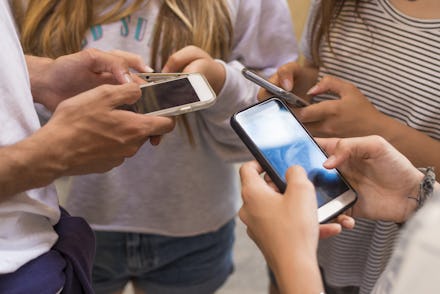A new study of over 3,000 teens found a link between time spent online and symptoms of depression

Teenagers are sinking more than one-third of their days into screen time. As it turns out that may not be the best thing for the developing mind. A new, massive study conducted by researchers at Montreal's Sainte-Justine Hospital found that screen time, particularly the use of social media, is linked to an increased feeling of depression in teens.
The study, published in the Journal of the American Medical Association, tracked the online activity of more than 3,800 kids for six years. Between 2012 and 2018, the students involved in the study self-reported how many hours per week they spent on social media, playing videos games, and watching television. Along with the hours logged on screens, the students were also asked to rate on a scale from zero to four how much they were experiencing seven different symptoms of depression, including feelings of loneliness, hopelessness, and sadness. As researchers dug into the numbers, they discovered that social media consumption proved to be the most harmful way for kids to spend their time online. Teens who spent more time on Facebook, Instagram, and other social platforms showed increased symptoms of depression, more than any other form of screen time. In fact, researchers found that each additional hour spent on social media was often associated with an uptick in the symptoms of depression experienced by a student — though it didn't indicate how many hours on average teens spent on social media.
The researchers involved with the study theorized that more time spent on social media exposed the kids to content that typically makes them feel bad about themselves. For example, if you browse Instagram long enough, it might start to feel like everyone is traveling and showing off their favorite possessions while you're sitting on your phone. That feeling can also lead to a vicious cycle; spending more time on social media makes you feel bad about yourself, and feeling bad about yourself makes you spend more time on social media.
While the research conducted by experts at Sainte-Justine Hospital is quite extensive, it is not definitive. The study is somewhat limited because it doesn't differentiate among different social media platforms, so it can't distinguish between the quality of time spent on Facebook as opposed to Instagram or Snapchat. It also doesn't necessarily account for the fact that some of the kids involved in the study may have already been experiencing symptoms of depression, which may lead to an increased amount of screen time.
Prior to this study, the results of attempts to measure the impact of screen time on young minds have been mixed. An analysis of self-reported screen usage of 17,000 adolescents conducted by Oxford University suggested that the general well being of teens is not affected by extended screen time and is unlikely to be a driving force of mental illness. However, a number of other studies have found adverse effects from spending a lot of time online. A team of researchers released a paper earlier this year that suggested increased time spent on smartphones and computers has resulted in less time spent in person with one another and, in turn, to an uptick in feelings of loneliness experienced by young people. Another massive study published last year looked at data of more than 40,000 kids collected by the Census Bureau’s 2016 National Survey of Children’s Health and found that children who spent more time on devices were more likely to be diagnosed with symptoms of depression and anxiety. The research also suggested that kids who spent more than seven hours a day on screens were more easily distracted and had difficulties finishing tasks and connected with others. That falls in line with research conducted by Cambridge University that found teens who experience excessive screen time get worse grades. And social media, in particular, can be harmful to the self-esteem of teens and young adults. A study conducted by the Royal Society for Public Health found that increased use of platforms like Snapchat, Facebook, Twitter and Instagram all lead to increased feelings of depression, as well as anxiety, poor body image, and loneliness.
Interestingly, the study conducted by researchers at Sainte-Justine Hospital found one type of screen time to have next to no depressive effects on kids: playing video games. According to the researchers, that is perhaps because much of gaming is social. More than 70 percent of time playing games is done with others online or in person, according to the study. Research on the effects of videos games is similarly all over the place, though there is evidence to suggest that gaming addiction carries considerable negative effects to mental health. A recent study from researchers at Nottingham Trent University and the University of Oulu in Finland found that gamers can be prone to symptoms of depression, anxiety and obsessive behaviors.
While it's still not entirely clear the exact effect screen time and social media presence has on teens, but it does seem like spending less time on screens for recreational purposes wouldn't hurt. Researchers at New York University and Stanford University found that people who leave Facebook felt happier (albeit less informed), and there are tons of anecdotal stories from young people who ditch social media and feel better about themselves. Quitting the internet and putting down screens altogether isn't required and likely isn't even practical for most people, but taking an approach of "everything in moderation" may just make life a little better.